Exercise and participation in sport is incredibly healthy and ultimately low risk. However, screening tests can be valuable for athletes, as they are pushing their bodies past normal endurance limits. Irrespective of the activity, the heart is under tremendous strain. If this is coupled with some pre-existing factors, the already increased likelihood of damage is further amplified.
The SportsCardiologyBC clinic assists athletes in staying active and ensuring continued safety while participating in sport and exercise.
The SportsCardiologyBC team has evaluated thousands of recreational, collegiate, provincial, national, and professional level athletes across British Columbia.
The process starts with a family practitioner completing the SportsCardiologyBC referral form, which includes: Demographics, Reason for cardiovascular evaluation, and Results from prior testing.
Upon receiving your referral the clinic secretary will contact you to arrange the next steps. These could include telephone interviews, consultations, screening tests, and/or diagnostic evaluations. Below are tests performed at SportsCardiologyBC.
Our cardiologists can refer patients and study participants for additional cardiac tests if necessary.
Some of these tests may include, but are not limited to:
- Cardiac Computed Tomography (CT)
- Cardiac MRI
- Chest X-ray
- Echocardiogram (transthoracic, transesophageal, stress, doppler)
- Myocardial Perfusion (MIBI) Stress Test
Electrocardiogram (ECG)
This test records the electrical activity of the heart at rest and provides information on heart rate, rhythm, coronary artery disease, old heart attacks, and how well certain treatments are working.
This is a non-invasive and painless test that requires 10 electrodes (stickers) be placed on the chest area, wrists, and ankles. The leads (wires) are connected from the ECG module to those stickers, and we ask the patient/participant to lay still for at least 10 seconds so that we can record a clear reading.
Exercise Stress Test (EST)
A cardiac stress test is a test that measures the heart’s ability to respond to external stress in a controlled environment. Exercise allows doctors to detect abnormal heart rhythms and diagnose the presence or absence of significant coronary artery disease. The results show how well your heart responds to the stress of exercising at different intensities.
The exercise stress test is set up similarly to an ECG, however the module is portable and wireless so that the patient or participant can easily run or cycle while wearing it.
Treadmill
This test assesses your exercise capacity and your heart rate and rhythm while exercising by walking and/or running on a treadmill. You will be instructed to initially walk at a speed and grade of 1.7 mph and 10% grade, respectively. Every 3 minutes the speed and incline increases. Stage 2 is 2.5 mph at a 14% grade, stage 3 is 3.4 mph and 14% grade, stage 4 is 4.2 mph and 16% grade, stage 5 is 5.0 mph and 18% grade and stage 6 is 5.5 mph and 20% grade. This is known as the Bruce Protocol. You will be encouraged to exercise until you are too tired to continue, unless you experience symptoms that would cause you or the research team to terminate the test early. Your heart rate and rhythm will be continuously recorded throughout the test and your blood pressure will be measured at 2.5 minutes into each stage.
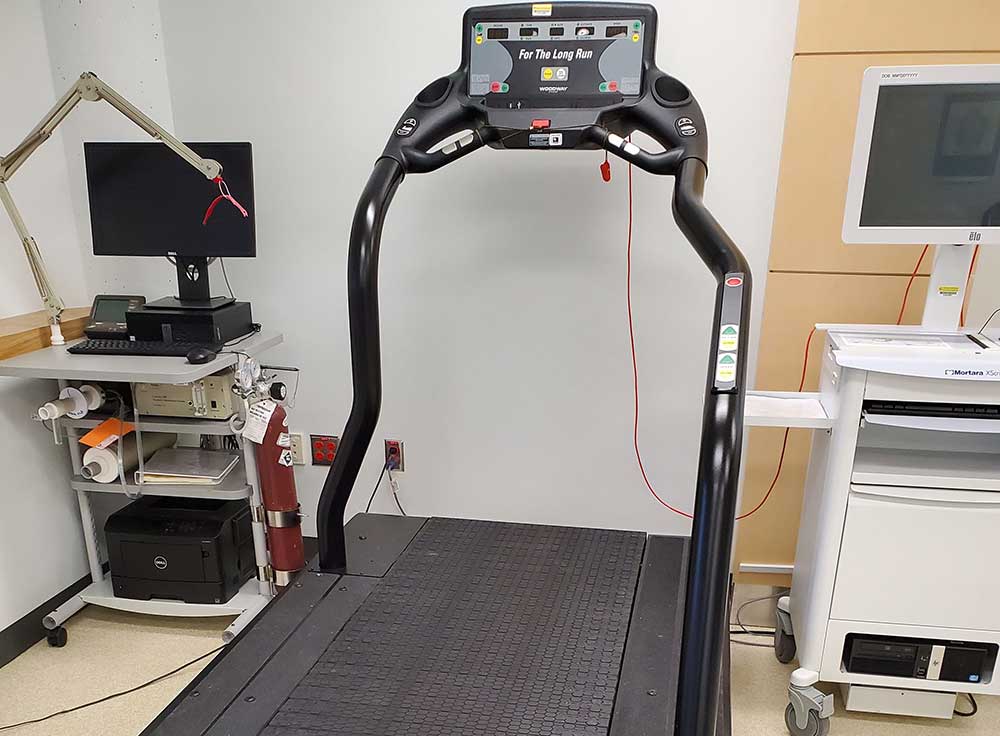
Stationary Bike
This test assesses your exercise capacity and your heart rate and rhythm while exercising by cycling on a bike. There are a variety of different protocols that can be selected depending on the patient’s comfort and experience on a bike. Each protocol starts off relatively easy and the resistance increases with each stage. The patient must keep a minimum amount of rotations per minute (or RPM) to continue with the test. Your heart rate and rhythm will be continuously recorded throughout the test and your blood pressure will be measured at the end of each stage.
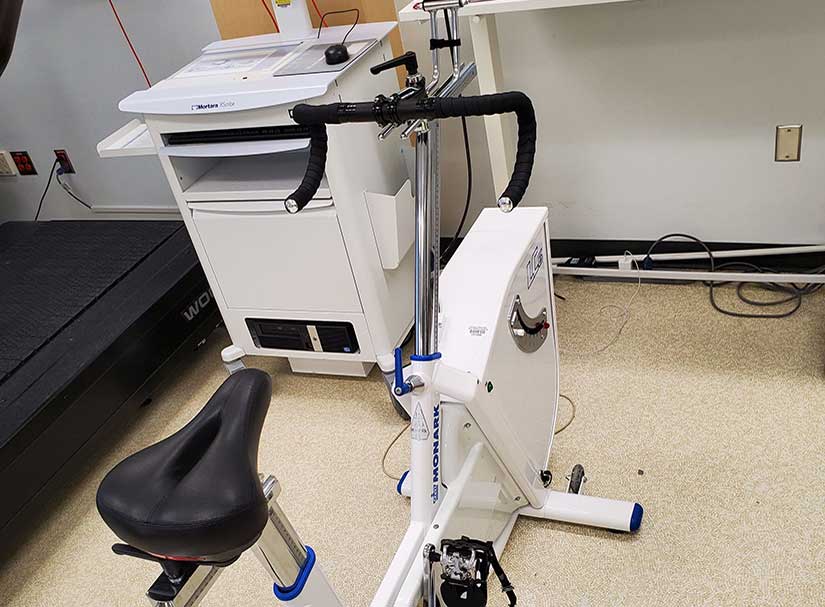
LEARN MORE ABOUT OUR CLINIC
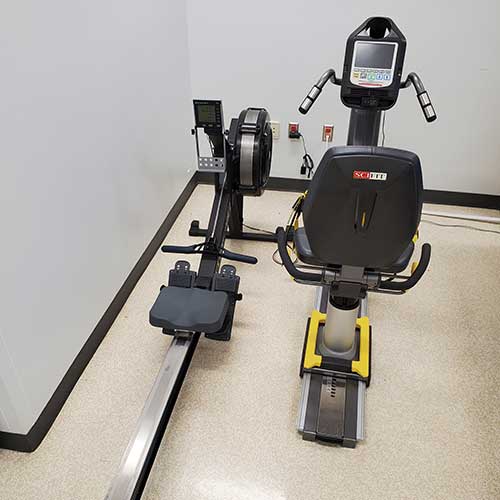 The SportsCardiologyBC team is in the midst of developing exercise stress test protocols on not only the treadmill and the bike, but other fitness equipment such as the rowing machine and recumbent bike. This may allow us to better assess individuals who primarily use this type of equipment.
The SportsCardiologyBC team is in the midst of developing exercise stress test protocols on not only the treadmill and the bike, but other fitness equipment such as the rowing machine and recumbent bike. This may allow us to better assess individuals who primarily use this type of equipment.
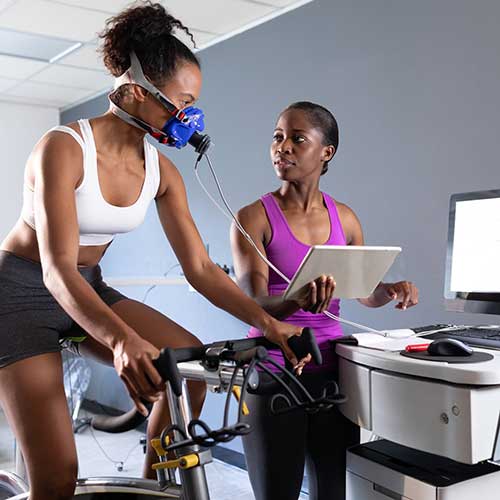 Due to COVID-19, we are currently not offering VO2 max testing.
Due to COVID-19, we are currently not offering VO2 max testing.
Stay tuned for an exciting announcement later this year regarding cardiopulmonary exercise testing with SportsCardiologyBC!
VO2 Maximum testing is used to test the aerobic endurance or cardiovascular fitness of athletes before and at the end of a training cycle. A patient’s VO2 max is the maximum amount of oxygen they can utilize during exercise and is measured in milliliters of oxygen consumed in one minute, per kilogram of body weight (mL/kg/min).
This test can be administered on the treadmill or the bike. A mask will be placed to cover the face and catch all air inhaled and exhaled so that it can be measured through our machine. Using whichever protocol works best, you will then try to reach your maximum exercise threshold, stopping when you can no longer continue at the pace, incline, or wattage needed, or if there is a clinically indicated reason to end the test.
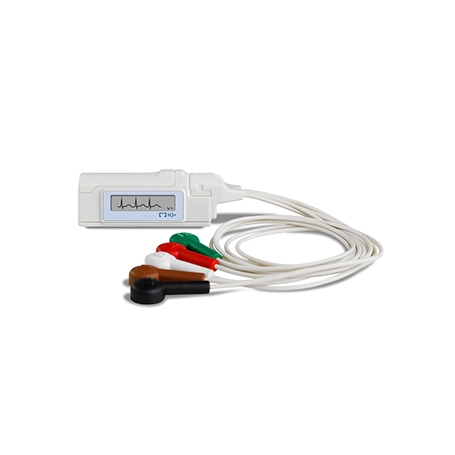 This is a small device that continuously records every beat your heart takes during the 24 to 48-hour period that you wear it. It is used to detect heart rate or rhythm irregularities that an ECG could not capture. 5 electrodes (stickers) are placed on the chest in specific positions and then connected to the monitoring device through 5 leads (wires). The device is held in a carrying case that can hook onto a belt loop.
This is a small device that continuously records every beat your heart takes during the 24 to 48-hour period that you wear it. It is used to detect heart rate or rhythm irregularities that an ECG could not capture. 5 electrodes (stickers) are placed on the chest in specific positions and then connected to the monitoring device through 5 leads (wires). The device is held in a carrying case that can hook onto a belt loop.
We encourage our patients and participants to continue engaging in their normal daily routines and activities. This includes exercise unless otherwise indicated. The monitor is not waterproof, so no bathing, showering, or swimming is permitted while wearing the device.
 The DR400 Patch is a small and versatile monitor that can record the heart continuously for a longer period of time than the traditional Holter monitor. The patch is used for 5 – 10 day recording periods in our clinic; however, it can record up to 30-days on a single charge. The device only weighs 34 grams (1.2 ounces) and can be worn during workouts and showers. This device uses one large adhesive sticker that is placed on the left side of the chest just below the clavicle. The small monitor is conveniently wireless and attaches to the sticker with metal snap fasteners.
The DR400 Patch is a small and versatile monitor that can record the heart continuously for a longer period of time than the traditional Holter monitor. The patch is used for 5 – 10 day recording periods in our clinic; however, it can record up to 30-days on a single charge. The device only weighs 34 grams (1.2 ounces) and can be worn during workouts and showers. This device uses one large adhesive sticker that is placed on the left side of the chest just below the clavicle. The small monitor is conveniently wireless and attaches to the sticker with metal snap fasteners.
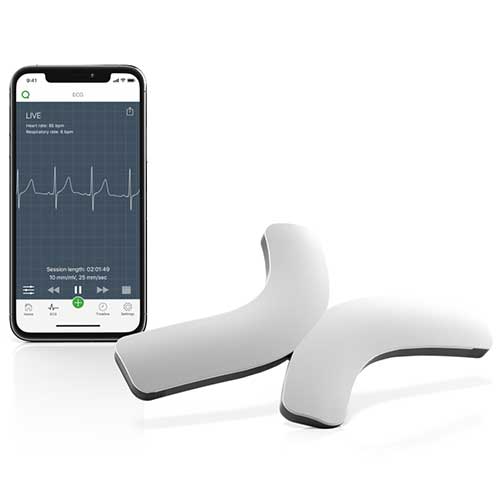 This is a cardiac monitoring device that can be used for a longer period, with the standard amount of time being 1-2 weeks. This device does not use sticker electrodes like the Holter monitor but has metal electrodes on the back of the device that replace the need for stickers. This enables the patient or participant to remove the device and shower, bathe, or swim whenever necessary and easily put it back on.
This is a cardiac monitoring device that can be used for a longer period, with the standard amount of time being 1-2 weeks. This device does not use sticker electrodes like the Holter monitor but has metal electrodes on the back of the device that replace the need for stickers. This enables the patient or participant to remove the device and shower, bathe, or swim whenever necessary and easily put it back on.
QardioCore connects to patients’ phones and records live data (must be connected to WIFI or data). You can also connect with us while wearing it through a user-friendly app to send any symptoms, medication usage, and exercise times.
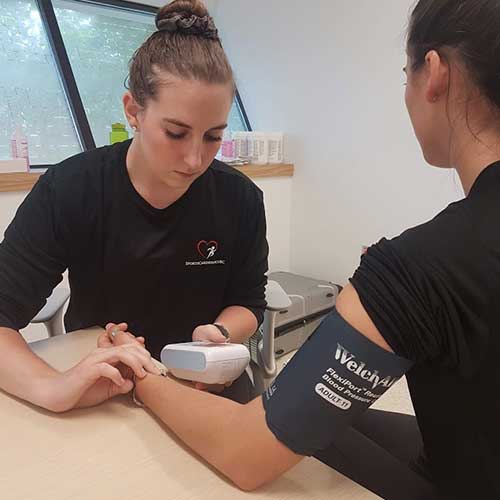 Blood pressure can be taken at rest in the cardiologist’s office, in the Stress Test Innovation Lab, or for a study. Blood pressure can also be taken while exercising during a stress test. Measurements can be obtained using an automatic machine or manually.
Blood pressure can be taken at rest in the cardiologist’s office, in the Stress Test Innovation Lab, or for a study. Blood pressure can also be taken while exercising during a stress test. Measurements can be obtained using an automatic machine or manually.
Chronically high blood pressure (hypertension) can be dangerous to your health. Over time, it can cause pathological thickening of the heart muscle, damage to the coronary and cerebral arteries, increasing your risk of cardiovascular disease and stroke. High blood pressure or hypertension is the number one risk factor for stroke and heart failure. Fortunately, once detected, hypertension is usually controllable with diet, exercise, and medication.
Normal blood pressure value: less than 120/80
Elevated blood pressure value: 120-129/greater than 80
Stage I Hypertension value: 130-139/80-89
Stage II Hypertension value: greater than 140/90
A 24-hour blood pressure monitor takes blood pressure readings continuously over a 24-hour period: every 30 minutes during the day and every 60 minutes at night. The readings are averaged over this period to obtain the patient’s average blood pressure. This is also beneficial in showing how your blood pressure changes throughout the day while performing different activities and if there is a nocturnal dip at night. It also is a useful tool in determining if the patient has “White Coat Hypertension,” which is an increase in blood pressure when in the doctor’s office.
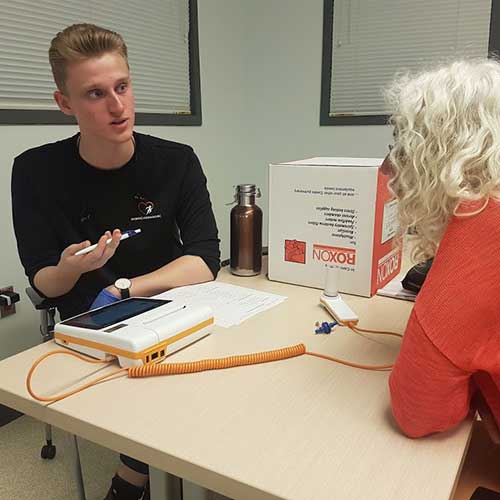 The spirometry test is a part of a screening study carried out by SportsCardiologyBC. It is used to measure how well your lungs are functioning by recording the amount of air you breathe in and out, and the speed of your breath.
The spirometry test is a part of a screening study carried out by SportsCardiologyBC. It is used to measure how well your lungs are functioning by recording the amount of air you breathe in and out, and the speed of your breath.
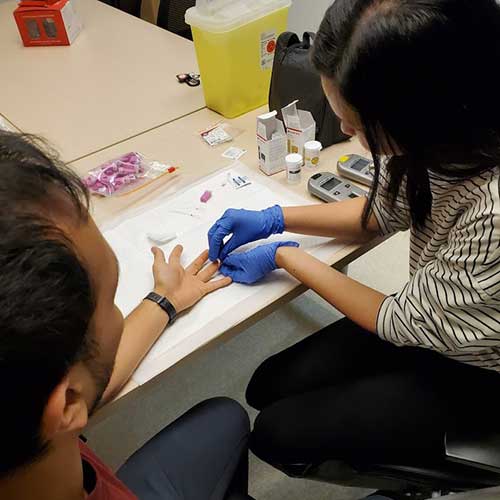 This test is a part of a screening study carried out by SportsCardiologyBC. The blood analysis results are generated by the finger prick method and include:
This test is a part of a screening study carried out by SportsCardiologyBC. The blood analysis results are generated by the finger prick method and include:
Total cholesterol (TC)
High density lipoprotein (HDL) cholesterol
Low density lipoprotein (LDL) Cholesterol
Triglycerides
TC/HDL ratio
Random Blood Sugar
A minimum 3 hour fast (no food or beverages other than water) is required for more accurate readings using this method.
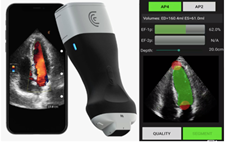 In our clinic, consults with a cardiologist include the use of Point-of-care ultrasound (POCUS). It is a portable and handheld ultrasound device that provides real-time bedside images that can assist in clinical decision making. Images can be analyzed in real-time or stored for off-line review. This provides the cardiologist with more information during the consult to potentially reduce false positives, and to identify disease not detected by traditional cardiovascular screening modalities (history, physical examination, and ECG). This device cuts wait times for an Echocardiogram and does not require the patient to physically move to a radiology suite to be scanned. If more information is required, a formal Echocardiogram will be ordered.
In our clinic, consults with a cardiologist include the use of Point-of-care ultrasound (POCUS). It is a portable and handheld ultrasound device that provides real-time bedside images that can assist in clinical decision making. Images can be analyzed in real-time or stored for off-line review. This provides the cardiologist with more information during the consult to potentially reduce false positives, and to identify disease not detected by traditional cardiovascular screening modalities (history, physical examination, and ECG). This device cuts wait times for an Echocardiogram and does not require the patient to physically move to a radiology suite to be scanned. If more information is required, a formal Echocardiogram will be ordered.
Contact Us
Phone: +1 (604) 822-9494
Fax: +1 (604) 822-7625
Email: scbc.research@vch.ca
Referrals
Fax: +1 (604) 822-7625
SportsCardiologyBC
Room #S110
UBC Hospital
2211 Wesbrook Mall
Vancouver B.C.
V6T 2B5
VGH / UBC Foundation
SportsCardiologyBC is supported by donations to VGH &
UBC Hospital Foundation. Your donations ensure that
our highly specialized program can continue to invest
in research, cardiovascular screening and public
education to improve the health of British
Columbians and athletes around the world.
